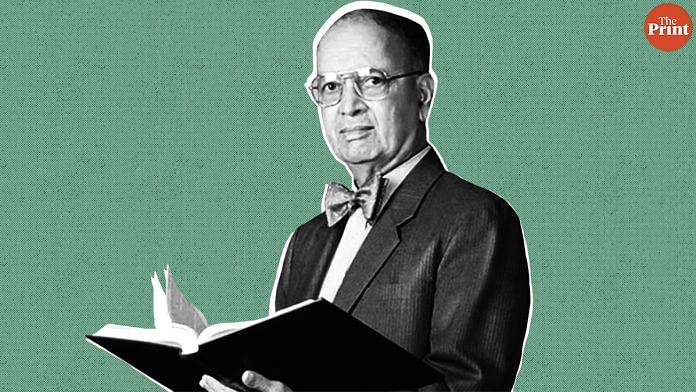New Delhi: Exactly 25 years ago today, India lost one of its pioneering industrialists and businessmen Shantanurao Laxmanrao Kirloskar, the man behind the growth of the Kirloskar Group.
Often referred to as SLK, Kirloskar not only worked towards making an impact in the country’s industrial sector, but also dared to challenge the policies of the Congress government after India gained independence.
ThePrint remembers Kirloskar, the visionary, who knew how to make India self-reliant and yet encouraged it to engage with the world, long before globalisation happened.
Also read: Jamsetji Nusserwanji Tata, a Swadeshi who tried to make India a manufacturing hub
Early life
Kirloskar was born on 28 May 1903 in Solapur in a family of entrepreneurs who set the stage for the establishment of one of India’s biggest engineering conglomerates — Kirloskar Group.
His father Laxmanrao Kirloskar was the founder of the Group.
Shantanurao did his primary education from Kirloskarwadi, an industrial township that his father had set up, and then completed his secondary education from New English School, Pune.
Shantanurao was one of the first Indians to graduate from the Massachusetts Institute of Technology (MIT), where he completed his graduation in mechanical engineering in 1926.
The Kirsloskar Group has its humble beginnings from the time Laxmanrao set up a small bicycle repair shop in 1888. He manufactured the country’s first iron plough that not only took the company to new heights but also started an industrial revolution in India. Shantanurao then expanded the operations of the Kirloskar Group.
From 1920 when Kirloskar Brothers was formed, Shantanurao went on to establish a number of companies under Kirloskar Group. One such company — Kirloskar Oil Engines Ltd (KOEL) — grew rapidly under his helm and vision, becoming the largest diesel engine company of the country by 1960s.
Shantanurao was also one of the central figures behind the formation of the Federation of Indian Chamber of Commerce & Industries (FICCI) in 1927.
He felt that industrialisation with a strong focus on manufacturing would fast-track India’s economic growth, which was desperately needed given the state of affairs in the country after independence. And for this he fought hard on many occasions, including the time when he was finally able to form KOEL before which he had once famously said “factories have a longer life than human beings”.
Criticism of Congress
Shantanurao had major disagreements with the political system in India after independence. Conveying that the socialist structure in India would not serve the nation much economically, he was believed to have once said that “economic preparedness is as vital as military preparedness”.
He criticised the Congress government for imposing “rules, controls and regulations” that led to the concentration of economic power in the hands of some politicians.
In his autobiography Cactus and Roses, Shantanurao wrote the Congress government’s decisions and policies were undermining the growth of private enterprises in India.
Stating that India’s first Prime Minister Jawaharlal Nehru and his ministers were “shrewd politicians”, Shantanurao wrote: “All the Governments — the pre-split Congress Government, the first Indira Government, the Emergency Government, the Janata Government and today’s second Indira Government — have shut their eyes to the damage which the controls are doing. All they see is the advantage of these controls to the politicians.
“Hence, in spite of any desire they feel to eliminate restrictions on the economy and to make progress on the economic front, they neither wish nor dare to reduce any of those controls or restrictions which effectively inhibit business”, he wrote.
Despite this, Shantanurao deliberated extensively with the central governments to fast track the pace of industrial production and growth in the country.
Recognition
Shantanurao was awarded the Padma Bhushan in 1965. He passed away on 24 April 1994. In Shantanurao’s honour and to mark his 100th birth anniversary, the government led by Atal Bihari Vajpayee had released a postage stamp in 2003.
Also read: Jamnalal Bajaj, the Gandhian capitalist who was the Mahatma’s ‘Merchant Prince’




We are proud of SLK.. & KBL GROUP
My tributes to the great man Mr Kirloskar. Congress and socialism stink.